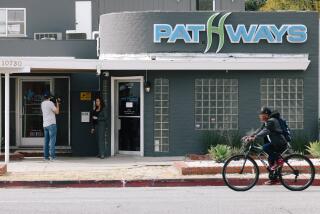Inventor of ‘Suicide Machine’ Charged With Murder
- Share via
PONTIAC, Mich. — A doctor who invented a device that a woman used to kill herself was charged with first-degree murder Monday by a prosecutor who said he did not want his county to become a “suicide Mecca.”
Janet Adkins, 54, of Portland, Ore., died June 4 after being hooked to the device invented by Dr. Jack Kevorkian of Royal Oak. She had Alzheimer’s disease, which had been diagnosed in June, 1989.
Kevorkian connected Adkins to an intravenous solution that would stop her heart, but she activated the switch that allowed it to flow into her veins.
A recently completed toxicology report identified the solution as the cause of death, Oakland County Prosecutor Richard Thompson told reporters in announcing the charges. The autopsy confirmed that the woman suffered from Alzheimer’s.
Kevorkian, 52, was arraigned Monday and ordered jailed in lieu of $150,000 bail.
“Dr. Kevorkian was the primary and legal cause of Janet Adkins’ death. He cannot avoid his criminal culpability by the clever use of a switch,” Thompson said. “He constructed the suicide machine for the sole purpose of causing death. He saw Janet Adkins for the sole purpose of causing her death.”
The criminal charges were filed one day before a civil trial in Oakland County Circuit Court to determine whether Kevorkian can have his confiscated machine back.
“I find this to be a moral and legal outrage,” said Geoffrey Fieger, Kevorkian’s attorney, after the charges were filed. “It is an attempt by the prosecutor to grandstand. It is an attempt by the prosecutor to institute criminal proceedings to obtain an advantage in a civil case.”
Fieger said he was also outraged by the first-degree murder charge, which carries a possible life prison sentence on conviction.
Ronald and Janet Adkins traveled from Oregon to meet with Kevorkian after her illness was diagnosed as Alzheimer’s disease. The couple belonged to the Hemlock Society, an organization that promotes death on demand for the terminally ill.
More to Read
Sign up for Essential California
The most important California stories and recommendations in your inbox every morning.
You may occasionally receive promotional content from the Los Angeles Times.












